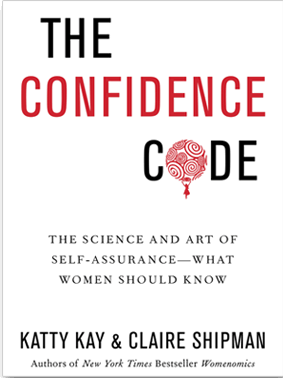Cracking the Confidence Code
by Shari GraydonAre you tired of seeing colleagues receive accolades while you toil away unnoticed? This book can boost your earning power and advance your career – seriously!
The Confidence Code, co-written by Claire Shipman and Katty Kay, explores confidence by delving into the fields of neuroscience and psychology in an effort to understand why women are falling short. Lack of confidence is a legitimate problem for us, with real consequences in the workplace. As Shipman and Kay write, “The natural result of under-confidence is inaction” and women’s careers may be stagnating as a result.
Genetics and upbringing bear the brunt of the blame. In our society we socialize boys and girls very differently from a young age, partly due to natural inclinations. Ultimately, we encourage boys to take risks and become resilient and teach girls to be agreeable and seek perfection.
This might serve us well in school, but it gives men the advantage in the workplace. Waiting until a composition is absolutely perfect before submitting it, or until we’ve performed exhaustive research before inserting our opinion into a conversation, only prevents us from sharing our work or advancing in our fields. The world doesn’t wait for a perfect response.
So how do we build up the courage to relax our standards? For one thing, it can be helpful to know that our pursuit of perfection is misguided. We often doubt our ability because men overestimate theirs. Too many of us are convinced that because the men around us are so much more self-assured, they must also be more knowledgeable. But that simply isn’t the case.
Shipman and Kay reveal that, in a number of studies, men have been shown not to know any more than their female peers. They’re merely more confident. When assessing our ability to complete a task, women typically underestimate our competence while men tend to overestimate theirs. A study at Columbia Business School found that, on average, men rate their performance 30% higher than it is, and benefit from this ‘honest overconfidence.’
This disparity explains why men so regularly outnumber women in competitive fields and senior positions, argue Kay and Shipman. Men tend to believe they’re worth more to their employers – and act accordingly. They negotiate for pay raises and better titles, request challenging assignments, and seek out opportunities to lead. Although women are just as capable of performing well, we often wait to be asked to take on these tasks.
But we don’t have to accept the status quo. The most useful lesson the book imparts is that, with some effort, any of us can grow more confident. The trick is to take risks and assess the results. We might not always get the outcome we want, but we’ll collect valuable feedback that will help improve future performance in the process.
So the next time you’re asked to share your expert opinion, trust that you were sought out for a reason and relish the chance to demonstrate what you know. Better yet, seek out opportunities. And remember that if you don’t, the person who steps up in your place may not be any more of an expert than you are.
Jasmine Ball is a valued volunteer at
Media Action, Informed Opinions’
parent organization.


